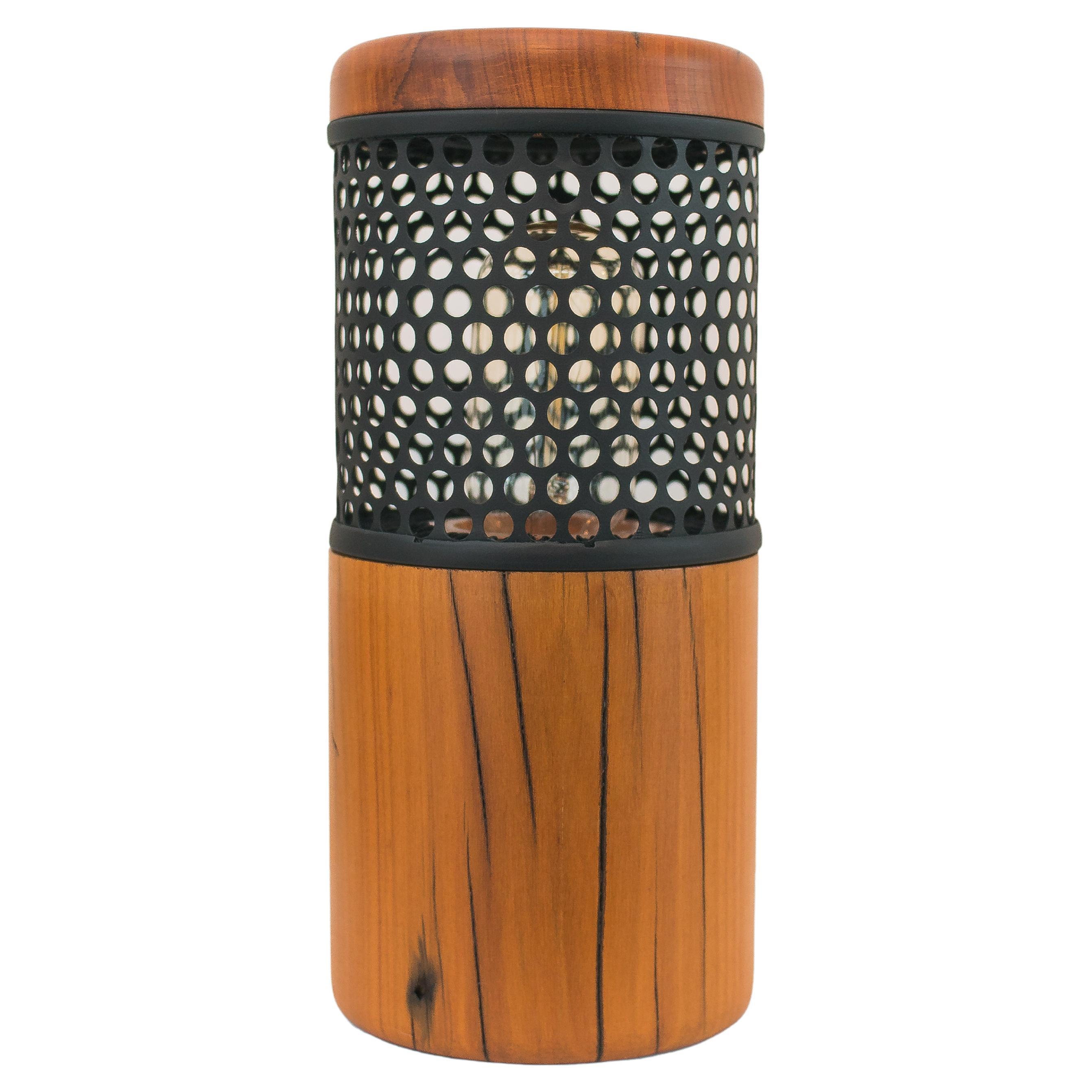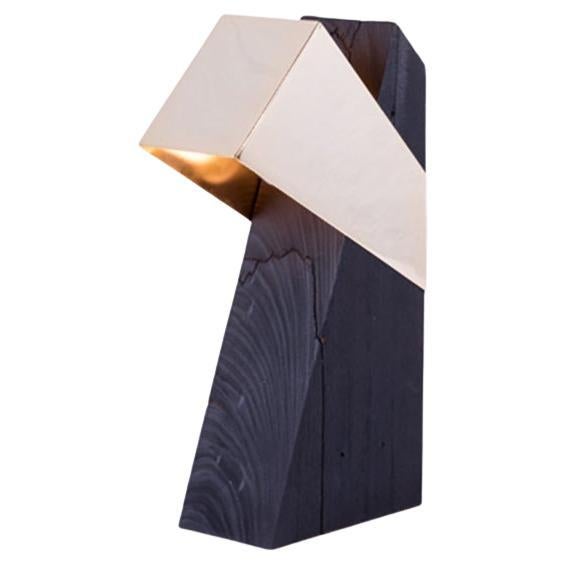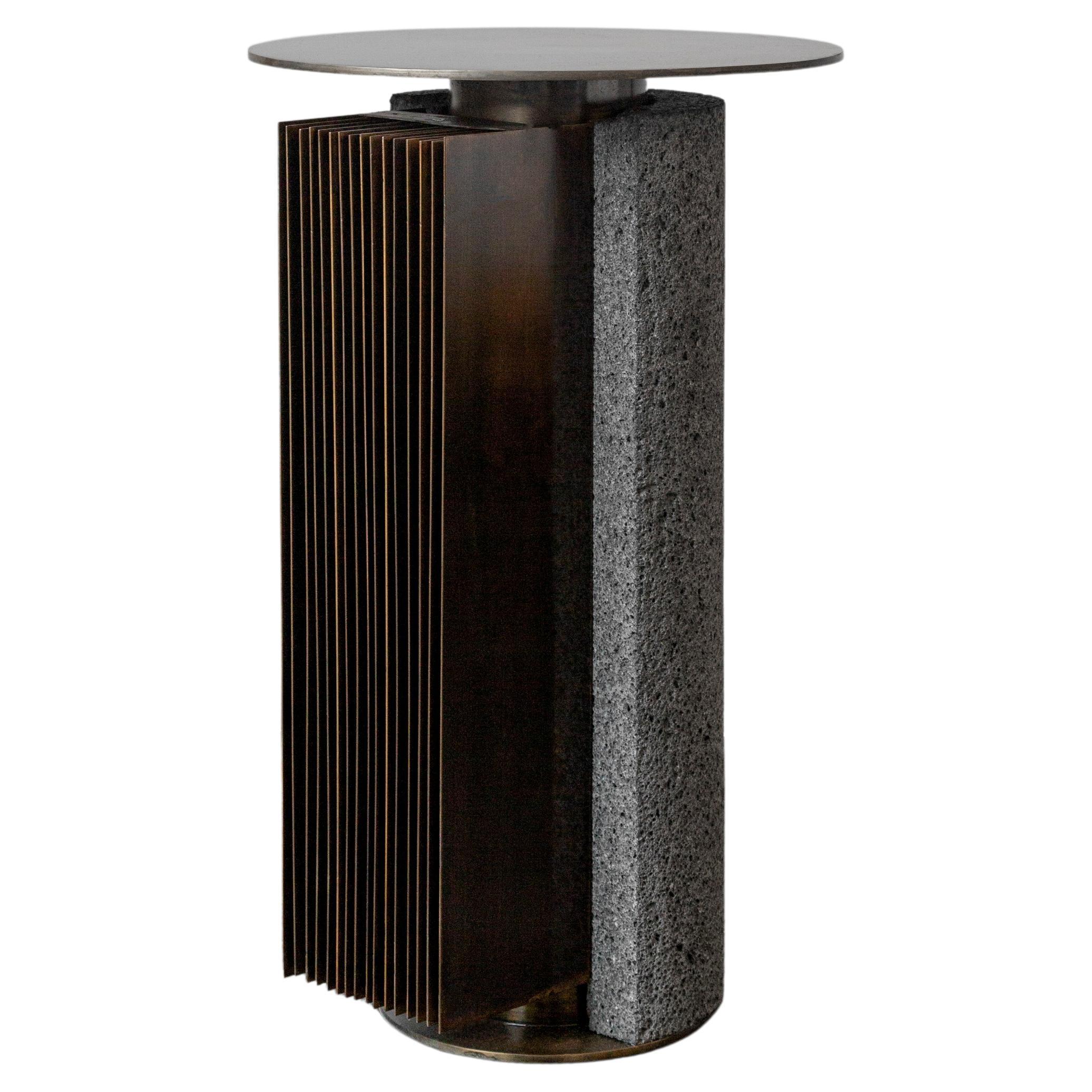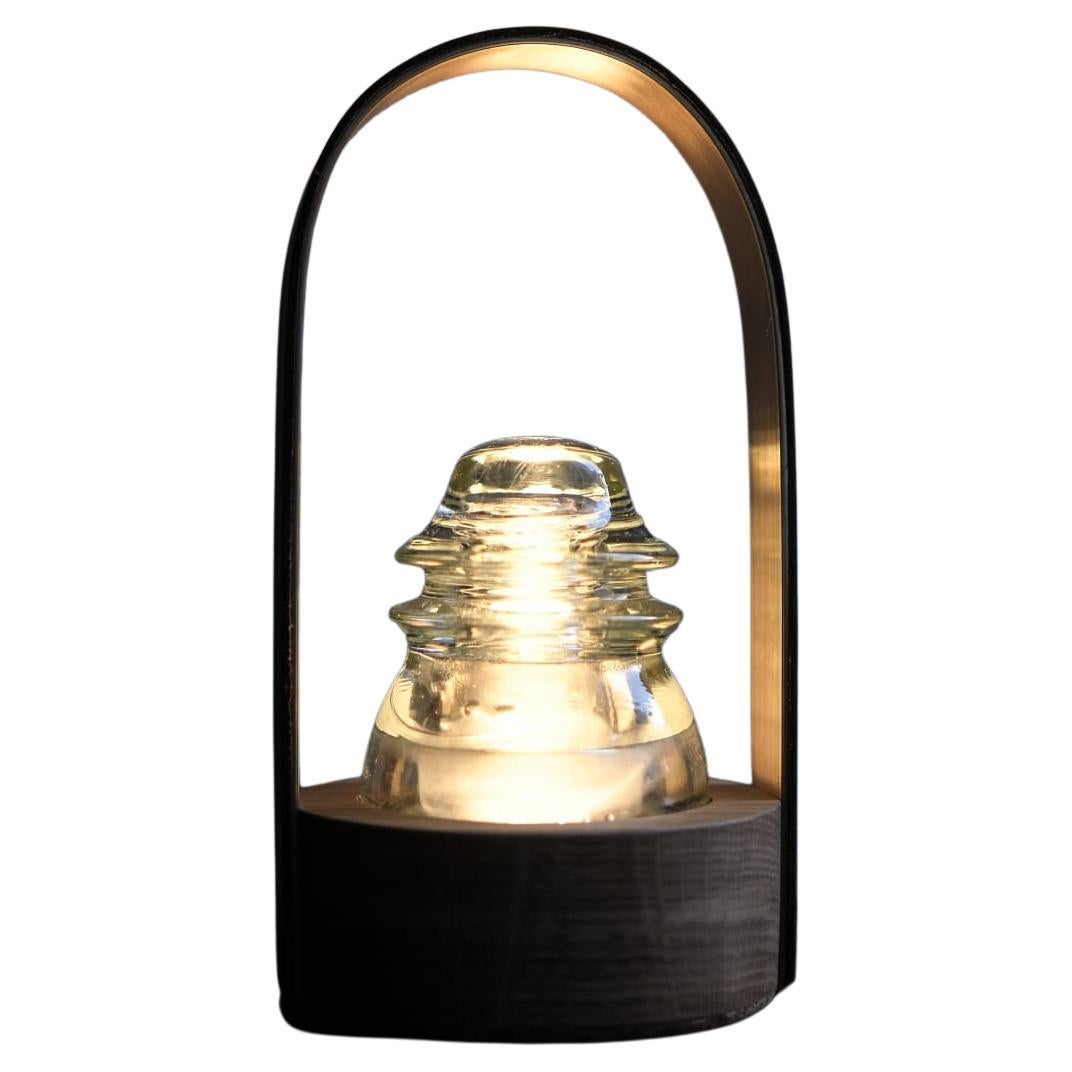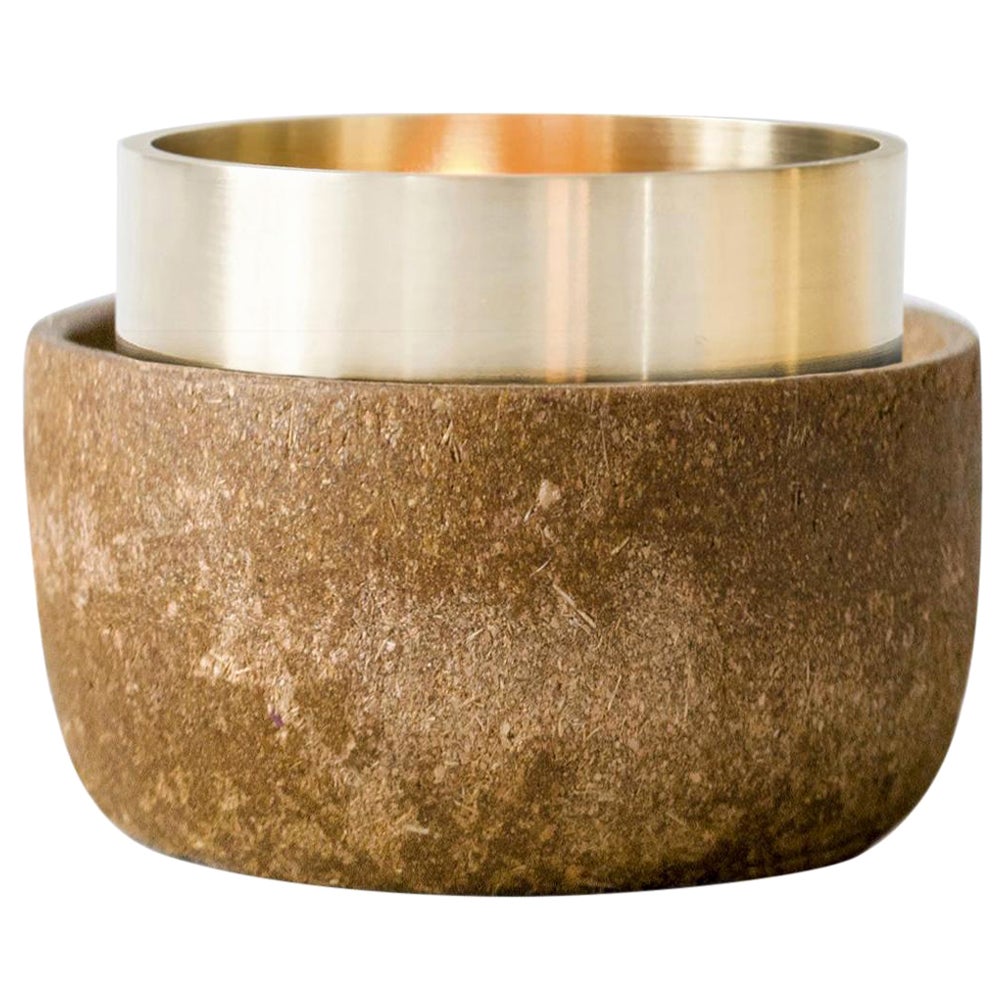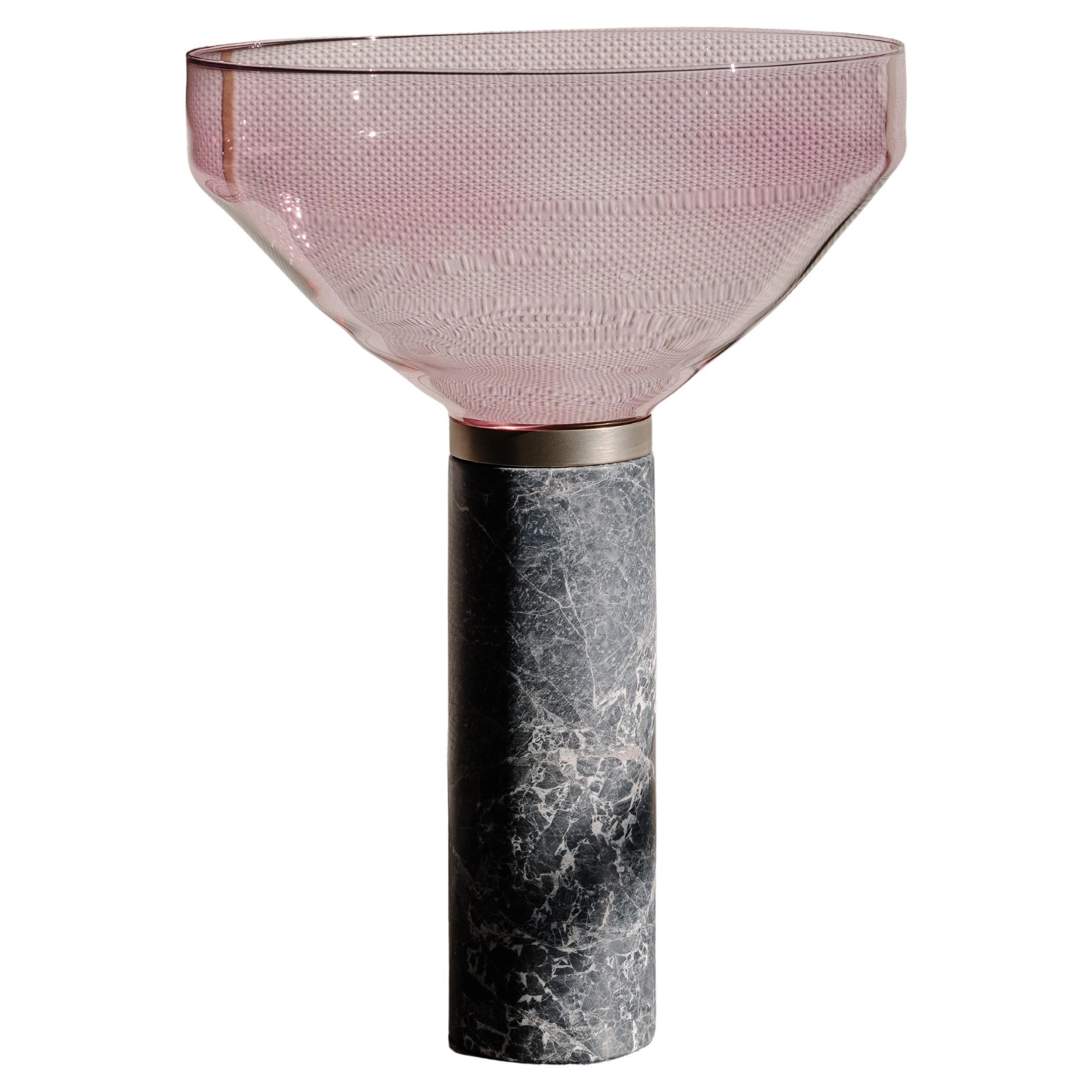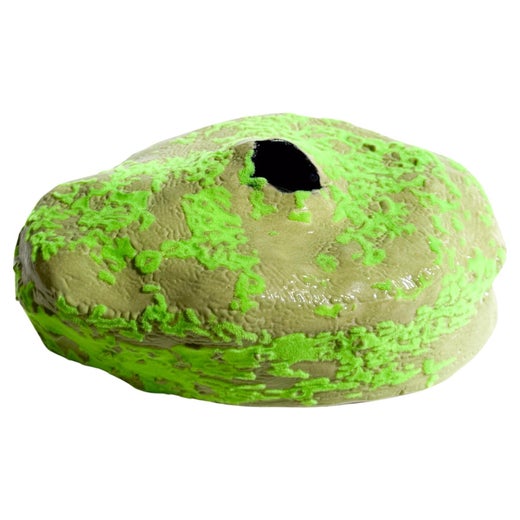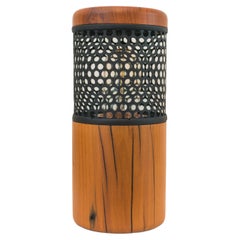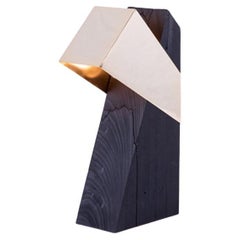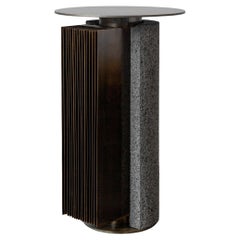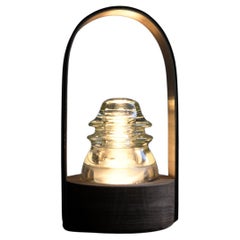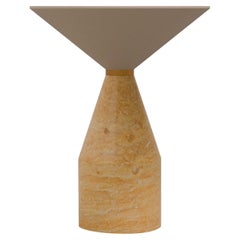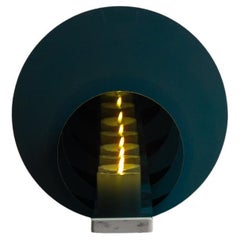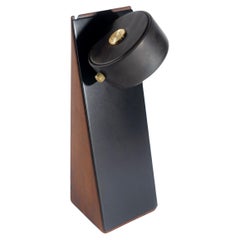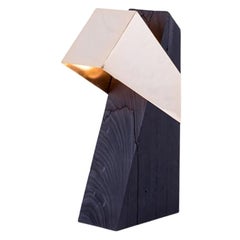Items Similar to Arrebol Tibor Diffuser by Studioroca
Want more images or videos?
Request additional images or videos from the seller
1 of 7
Arrebol Tibor Diffuser by Studioroca
$10,393.01per item
£7,932.79per item
€8,844per item
CA$14,649.20per item
A$16,087.67per item
CHF 8,401.28per item
MX$192,012.98per item
NOK 106,436.18per item
SEK 99,202.71per item
DKK 67,374.22per item
Quantity
About the Item
Arrebol Tibor diffuser by STUDIOROCA
Dimensions: W 18 x D 18 x H 30.5 cm
Materials: Volcanic rock, polished brass plated steel, glass.
Includes 1 essential oil 20mL bottle.
STUDIOROCA is a Mexico City design studio focused on architecture, interior design and contemporary furniture. Its penchant for collaboration, the promotion of local talent, artisanal skills and natural materials, and its ever-present pull toward sustainable practices have seen the studio create highly emotive environments and unique functional pieces that speak of a forward-thinking, borderless approach to design. Intro Through architecture, interior design and furniture, STUDIOROCA portrays a distinct Mexican aesthetic, where sophisticated, elegant designs become bold statements of strong masculine lines and dark moody shades that contrast dramatically with elongated curves and highly textured surfaces. Based in Mexico City, the studio has, since its inception, offered much more than simple design solutions, its impetus always being to meaningfully improve lives through design. By promoting, supporting and offering a platform for other Mexican designers in its two stores in Polanco and Condesa, STUDIOROCA has been at the forefront of the modern-day Mexican design movement for over 15 years. The studio’s ability to artfully blend its own architecture and interior design with both local and international product is testament to its glocal outlook. While proudly Mexican and inherently influenced by the country’s culture and craftsmanship, its designs talk to a cosmopolitan, international sense of style. STUDIOROCA’s respect for the environment and reverence of traditional skills has led to the pursuit of sustainable practices, while its affinity for collaboration and promotion of artisanal skills has seen the studio produce work in conjunction with countless talented designers and craftspeople. Its confidently utilitarian designs are the result of risk-taking, boundary-pushing processes that emerge from STUDIOROCA’s constant quest to establish innovative solutions, while simultaneously respecting each of its projects’ unique locations, incorporating the surrounding environment into the design language. Working closely with clients, a personal rapport ensures delving into the core of every design requirement, leading to the ultimate achievement of deeply embedded needs. Ultimately, what STUDIOROCA presents is a fresh iteration of Mexican design, a version which is at once moving, intoxicating and comforting. History STUDIOROCA was founded by Carlos Acosta and Rodrigo Alegre. When, in 2002, the two independent Mexico City architects were commissioned to work collaboratively on the architecture and interiors of a new spa, they were frustrated by the lack of affordable furniture available, and embarked on designing their own pieces for the project. And so STUDIOROCA was born. Initially a furniture store in the heart of the then up-and-coming leafy suburb of Condesa, it has developed into a fully fledged architecture and interior-design studio, with another store in the city’s high-end design district of Polanco, which opened in 2011. Its line of furniture, all designed and manufactured in Mexico, had humble production beginnings in a small kitchen-design factory, a foundation that has carried through into the studio’s current philosophy of small-scale, high-quality production. In conjunction with its own range of functional pieces, STUDIOROCA has always invited other local designers to showcase their work in its two stores, and, what started with three additional designers’ pieces in 2002, has led to collaborations with many more, now presenting the limited-edition work of 28 Mexican designers through its UNION- brand, while continuing to retail exclusive international brands such as Tom Dixon, Moooi and GAN. 2 More recently, the studio’s architectural and interior projects have included large housing developments and hotels, fully employing STUDIOROCA’s 360-degree approach to design. Founders and team Architects by training, founders Carlos Acosta and Rodrigo Alegre prefer to follow an unconventional, integrated model of design that incorporates its many varied facets, allowing their two unique approaches to complement one another. Rodrigo, who graduated from Universidad Anáhuac Norte, is able to envision how color and texture will combine as he explores the emotive nuances he wishes to create within a new environment. His abstract thoughts are brought to life by Carlos, the rational half of the design duo. Trained at Universidad Iberoamericana, with a student exchange to the University of Texas, Carlos’ ability to grasp volumes and spaces brings dreams to fruition through the perfect positioning of wall divisions, furniture pieces and light-streaming windows. Their small dedicated team of designers and architects plays an integral role in realizing the studio’s ambitious visions, with over 200 projects having been completed by this intimate team. Beyond designing, these passionate professionals offer practical solutions, bringing their experience in all forms of design to manifest in big-picture thinking that pays attention to detail, celebrates collaboration and goes the extra mile. The approachable, personal style with which the STUDIOROCA team works is a reflection on the responsibility its people place on themselves as architects and designers who venture beyond the drawing board. Sustainability STUDIOROCA’s focus on sustainability has seen the company establish itself as a trailblazer in the realization of buildings and furniture pieces that are produced with a sense of conscience and responsibility, taking into account the full production chain, from material source to distribution of wealth. The studio has done away with environmentally harmful varnishes on its furniture pieces, and now only use FSC-certified hardwood. It also pledges to keep materials to a minimum, a consideration most appreciated in its 77 range of furniture, where only the necessary functional structures have been designed, and where small leftover pieces of wood from bigger cuts are utilized, rather than sourcing new pieces. This approach continues in its architecture and interior designs, with 80% of materials sourced locally. This, coupled with its use of solar panels, the harvesting of rainwater, and the inclusion of indigenous gardens in its projects, has led to STUDIOROCA’s application for Leadership in Energy and Environmental Design (LEED) certification, which is currently under review. For the studio, sustainability has a much further reach than the natural environment, however. Its projects take into account social, cultural and economic sustainability too, by ensuring its production chain – from the craftspeople producing hand-worked elements, to its low-environmental-impact manufacturing line – all sits within Mexico so that the 3 communities benefiting financially are those who have been an integral part of the process. Architecture In STUDIOROCA’s architectural projects, authentic materials that are true to their Mexican origin, such as local mountain rocks, regional marble and indigenous wood, are utilized in new ways to highlight their natural rawness, deep texture and prized imperfections, imbuing buildings with unique character. It’s through such character that every structure portrays its personality, suited to the people who live, work and relax within it. This unpretentious use of materials follows through to metals, which are encouraged to rust and patinate as the building interacts with nature’s elements and becomes part of the environment surrounding it, giving projects an essential sense of place, where the here and now is as important as the then and there. Interior design STUDIOROCA’s interior style leans toward textured materials and dark hues contrasted with paler wood and lighter accent tones. These evocative, luxurious interiors are enlivened by carefully considered lighting that enhances the tonality of moody dark browns, deep blues and a spectrum of blacks, and highlights textures through illuminated reflections. Where environments dictate a paler palette, textures and materials make up the necessary contrast. Local willow wood on wall panels, flooring made from recinto volcanic rock, and countertops decorated with Mexico’s retapado marble become talking points, made even more appealing with plant life and greenery introduced indoors. Furniture Combining its deep respect for handcrafted, artisanal product, and its future-forward approach to technology and innovation, STUDIOROCA’s range of furniture places emphasis on high-quality offerings, producing its ranges in low quantities, often customized to suit the specific requirements of its varied projects. Veering away from industrialized production lines, it employs sophisticated hand-worked machinery, in line with its approach to sustainability and simplicity. The studio’s premiere collection (2002-2008) was shaped by a groundbreaking application of materials and forms, resulting in award-winning designs that set contemporary Mexican design on the map. Pieces from this collection were shown at Fabrica Mexicana and Museo de Arte Moderno in Mexico City and in the MoMA store in New York. The 2008 Eco collection initiated a change in the production of STUDIOROCA’s furniture pieces, adapting a sustainable view regarding design – a philosophy that continues to guide the studio’s practices today. Sourcing FSC-certified wood, eliminating varnishes, and using local materials wherever possible, this collection was the start of a conscious undertaking to work with local artisans and support local industry, an outlook that was celebrated at the launch of the Eco range at the Mexican Gallery of Design. Taking the sustainable sensibility a step further, the 77 range of 2010 made use of natural 4 waxes and oils and limited the use of glues, thus enabling the wood to be reused after its furniture lifespan. This playful range was designed with only the necessary structures and frames, transforming furniture to linear pieces where just the necessary materials are utilized and no superfluous details exist. The studio marked its 10-year anniversary with Diez (2012), a collection of 10 pieces especially designed by 10 of Mexico’s top designers and studios, which included Ariel Rojo, Carmen Cordera, CCubica, Gloria Cortina, Sebastián Ocampo, Sebastián Beltrán, Leonel Vivanco, Christian Vivanco, German Velasco and Carlos Torre. Sebastián Ocampo’s Minerva tables epitomised the ‘sustainability’ brief given to these creatives, his designs produced by artisans in Ixtlán de Juárez, Oaxaca, with local materials and manufacturing processes. The 2016 Turca range was yet another collaboration. The result is a collection that considers materials, production and final use of furniture from both countries’ perspectives. The studio’s latest range, produced in 2017 and 2018 to celebrate 15 years of furniture-making, is a new take on old forms, profiting from years of research and experimentation. Lamps, chairs and tables are re-envisioned in marble and scorched wood, allowing for multiple uses both inside and outdoors. No matter the year, or the range, STUDIOROCA’s furniture proudly honors Mexican design, its impeccable craftsmanship and its natural materials. Collaboration Through collaboration with both local and international designers, and attendance at design fairs such as Wanted Design in New York, STUDIOROCA has been instrumental in creating an awareness of and appreciation for Mexican design both locally and internationally, helping to develop a design industry that’s constantly pushing boundaries to venture forward. Since Design Week Mexico’s inception in 2008, STUDIOROCA has participated in this annual showcase of local talent. Since 2013, it has helped put together the event’s Diseño Contenido, where 20 shipping containers are assembled overnight in the Polanco neighborhood to exhibit Mexican design for one weekend only. During the 2014 version of Design Week Mexico, the studio collaborated with Tom Dixon Design Research Studio to launch the new BMW Mini Cooper four-door, creating a multi-faceted space that included a club, a barbershop and a stylish rooftop terrace, where they ingeniously suspended a vehicle from the ceiling. In the same year, STUDIOROCA and Tom Dixon collaborated again, this time for the launch of the British designer’s special-edition Hennesy XO bottle, creating a ‘Shop in Shop’ in the STUDIOROCA store in Polanco. The studio also organized a conference with the legendary designer in Museo Tamayo. For Design Week Mexico 2015, STUDIOROCA participated in Visión y Tradición, inviting five different artisans from Chiapas to create tableware, using their distinct materials and techniques, including glass, clay, wool and wood. These newly developed products went on to become part of STUDIOROCA’s UNION- range, a line of gallery-like special-edition homeware products and furniture pieces. Started in 2016, the UNION- label aims to launch, promote and commercialize the 5 best work from the country’s premier designers.
- Dimensions:Height: 12.01 in (30.5 cm)Width: 7.09 in (18 cm)Depth: 7.09 in (18 cm)
- Style:Post-Modern (Of the Period)
- Materials and Techniques:
- Place of Origin:Mexico
- Period:
- Date of Manufacture:2022
- Production Type:New & Custom(Current Production)
- Estimated Production Time:7-8 weeks
- Condition:
- Seller Location:Geneve, CH
- Reference Number:1stDibs: LU1219234284242
Galerie Philia
Galerie Philia is an international contemporary sculptural design and art gallery representing emerging and established designers and artists. The gallery is the brainchild of two brothers who share a lifetime passion for art, literature and philosophy. Their distinct academic background sets them apart from their peers, as it sees them following a rhizomatic and transcultural approach in the way they select works. This involves combining elements from multiple cultures in what becomes a network of harmoniously interconnected roots, ultimately revealing the beauty of each unique creation. The gallery’s non-hierarchical curation sits apart from the ephemerality of trends and focuses instead on the true aesthetic quality of the piece – alluring and timeless. Unlike others, Galerie Philia does not focus on a single style – whether minimalist, organic or raw – but rather embraces heterogeneity. The Galerie Philia takes pride in discovering new talents, providing them with multiple international platforms to showcase their latest creations. As well as propelling the newest generation of 21st century collectible design, Galerie Philia also works with internationally known design artists. Galerie Philia has a strong international presence, with galleries in Geneva, New York and Singapore. In addition to their permanent spaces, the gallery organizes temporary group exhibitions and artists residencies in first-class locations around the world.
Made to order creations can be done: please contact us for any request.
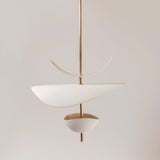
About the Seller
5.0
Recognized Seller
These prestigious sellers are industry leaders and represent the highest echelon for item quality and design.
Diamond Seller
Premium sellers with a 4.7+ rating and 24-hour response times
Established in 2015
1stDibs seller since 2015
5,129 sales on 1stDibs
Typical response time: <1 hour
- ShippingRetrieving quote...Shipping from: CDMX, Mexico
- Return Policy
More From This Seller
View AllFarol Table Lamp by Caio Superchi
Located in Geneve, CH
Farol table lamp by Caio Superchi
Dimensions: D 25 x W 11 x H 11 cm
Materials: Solid wood + perforated metal plate + filament lamp.
Also available in different colors.
All our...
Category
2010s Portuguese Post-Modern Table Lamps
Materials
Metal
$1,656 / item
Viga Table Lamp by Caio Superchi
Located in Geneve, CH
Viga table lamp by Caio Superchi
Limited edition of 10
Dimensions: D15 x W7 x H28 cm
Materials: metal, wood
All our lamps can be wired according to each country. If sold to th...
Category
2010s Portuguese Post-Modern Table Lamps
Materials
Metal
$1,903 / item
Arrebol Rayado Side Table by STUDIOROCA
Located in Geneve, CH
Arrebol Rayado Side Table by STUDIOROCA
Dimensions: W 30 x D 30 x H 50 cm
Materials: Stone, Brass Plated Steel
STUDIOROCA is a Mexico City design studio focused on architecture, interior design and contemporary furniture. Its penchant for collaboration, the promotion of local talent, artisanal skills and natural materials, and its ever-present pull toward sustainable practices have seen the studio create highly emotive environments and unique functional pieces that speak of a forward-thinking, borderless approach to design. Intro Through architecture, interior design and furniture, STUDIOROCA portrays a distinct Mexican aesthetic, where sophisticated, elegant designs become bold statements of strong masculine lines and dark moody shades that contrast dramatically with elongated curves and highly textured surfaces. Based in Mexico City, the studio has, since its inception, offered much more than simple design solutions, its impetus always being to meaningfully improve lives through design. By promoting, supporting and offering a platform for other Mexican designers in its two stores in Polanco and Condesa, STUDIOROCA has been at the forefront of the modern-day Mexican design movement for over 15 years. The studio’s ability to artfully blend its own architecture and interior design with both local and international product is testament to its glocal outlook. While proudly Mexican and inherently influenced by the country’s culture and craftsmanship, its designs talk to a cosmopolitan, international sense of style. STUDIOROCA’s respect for the environment and reverence of traditional skills has led to the pursuit of sustainable practices, while its affinity for collaboration and promotion of artisanal skills has seen the studio produce work in conjunction with countless talented designers and craftspeople. Its confidently utilitarian designs are the result of risk-taking, boundary-pushing processes that emerge from STUDIOROCA’s constant quest to establish innovative solutions, while simultaneously respecting each of its projects’ unique locations, incorporating the surrounding environment into the design language. Working closely with clients, a personal rapport ensures delving into the core of every design requirement, leading to the ultimate achievement of deeply embedded needs. Ultimately, what STUDIOROCA presents is a fresh iteration of Mexican design, a version which is at once moving, intoxicating and comforting. History STUDIOROCA was founded by Carlos Acosta and Rodrigo Alegre. When, in 2002, the two independent Mexico City architects were commissioned to work collaboratively on the architecture and interiors of a new spa, they were frustrated by the lack of affordable furniture available, and embarked on designing their own pieces for the project. And so STUDIOROCA was born. Initially a furniture store in the heart of the then up-and-coming leafy suburb of Condesa, it has developed into a fully fledged architecture and interior-design studio, with another store in the city’s high-end design district of Polanco, which opened in 2011. Its line of furniture, all designed and manufactured in Mexico, had humble production beginnings in a small kitchen-design factory, a foundation that has carried through into the studio’s current philosophy of small-scale, high-quality production. In conjunction with its own range of functional pieces, STUDIOROCA has always invited other local designers to showcase their work in its two stores, and, what started with three additional designers’ pieces in 2002, has led to collaborations with many more, now presenting the limited-edition work of 28 Mexican designers through its UNION- brand, while continuing to retail exclusive international brands such as Tom Dixon, Moooi and GAN. 2 More recently, the studio’s architectural and interior projects have included large housing developments and hotels, fully employing STUDIOROCA’s 360-degree approach to design. Founders and team Architects by training, founders Carlos Acosta and Rodrigo Alegre prefer to follow an unconventional, integrated model of design that incorporates its many varied facets, allowing their two unique approaches to complement one another. Rodrigo, who graduated from Universidad Anáhuac Norte, is able to envision how color and texture will combine as he explores the emotive nuances he wishes to create within a new environment. His abstract thoughts are brought to life by Carlos, the rational half of the design duo. Trained at Universidad Iberoamericana, with a student exchange to the University of Texas, Carlos’ ability to grasp volumes and spaces brings dreams to fruition through the perfect positioning of wall divisions, furniture pieces and light-streaming windows. Their small dedicated team of designers and architects plays an integral role in realizing the studio’s ambitious visions, with over 200 projects having been completed by this intimate team. Beyond designing, these passionate professionals offer practical solutions, bringing their experience in all forms of design to manifest in big-picture thinking that pays attention to detail, celebrates collaboration and goes the extra mile. The approachable, personal style with which the STUDIOROCA team works is a reflection on the responsibility its people place on themselves as architects and designers who venture beyond the drawing board. Sustainability STUDIOROCA’s focus on sustainability has seen the company establish itself as a trailblazer in the realization of buildings and furniture pieces that are produced with a sense of conscience and responsibility, taking into account the full production chain, from material source to distribution of wealth. The studio has done away with environmentally harmful varnishes on its furniture pieces, and now only use FSC-certified hardwood. It also pledges to keep materials to a minimum, a consideration most appreciated in its 77 range of furniture, where only the necessary functional structures have been designed, and where small leftover pieces of wood from bigger cuts are utilized, rather than sourcing new pieces. This approach continues in its architecture and interior designs, with 80% of materials sourced locally. This, coupled with its use of solar panels, the harvesting of rainwater, and the inclusion of indigenous gardens in its projects, has led to STUDIOROCA’s application for Leadership in Energy and Environmental Design (LEED) certification, which is currently under review. For the studio, sustainability has a much further reach than the natural environment, however. Its projects take into account social, cultural and economic sustainability too, by ensuring its production chain – from the craftspeople producing hand-worked elements, to its low-environmental-impact manufacturing line – all sits within Mexico so that the 3 communities benefiting financially are those who have been an integral part of the process. Architecture In STUDIOROCA’s architectural projects, authentic materials that are true to their Mexican origin, such as local mountain rocks, regional marble and indigenous wood, are utilized in new ways to highlight their natural rawness, deep texture and prized imperfections, imbuing buildings with unique character. It’s through such character that every structure portrays its personality, suited to the people who live, work and relax within it. This unpretentious use of materials follows through to metals, which are encouraged to rust and patinate as the building interacts with nature’s elements and becomes part of the environment surrounding it, giving projects an essential sense of place, where the here and now is as important as the then and there. Interior design STUDIOROCA’s interior style leans toward textured materials and dark hues contrasted with paler wood and lighter accent tones. These evocative, luxurious interiors are enlivened by carefully considered lighting that enhances the tonality of moody dark browns, deep blues and a spectrum of blacks, and highlights textures through illuminated reflections. Where environments dictate a paler palette, textures and materials make up the necessary contrast. Local willow wood on wall panels, flooring made from recinto volcanic rock, and countertops decorated with Mexico’s retapado marble become talking points, made even more appealing with plant life and greenery introduced indoors. Furniture Combining its deep respect for handcrafted, artisanal product, and its future-forward approach to technology and innovation, STUDIOROCA’s range of furniture places emphasis on high-quality offerings, producing its ranges in low quantities, often customized to suit the specific requirements of its varied projects. Veering away from industrialized production lines, it employs sophisticated hand-worked machinery, in line with its approach to sustainability and simplicity. The studio’s premiere collection (2002-2008) was shaped by a groundbreaking application of materials and forms, resulting in award-winning designs that set contemporary Mexican design on the map. Pieces from this collection were shown at Fabrica Mexicana and Museo de Arte Moderno in Mexico City and in the MoMA store in New York. The 2008 Eco collection initiated a change in the production of STUDIOROCA’s furniture pieces, adapting a sustainable view regarding design – a philosophy that continues to guide the studio’s practices today. Sourcing FSC-certified wood, eliminating varnishes, and using local materials wherever possible, this collection was the start of a conscious undertaking to work with local artisans and support local industry, an outlook that was celebrated at the launch of the Eco range at the Mexican Gallery...
Category
2010s Mexican Post-Modern Side Tables
Materials
Stone
$32,962 / item
Vitrum Table Lamp by Caio Superchi
Located in Geneve, CH
Vitrum table lamp by Caio Superchi
Dimensions: D12 x W12 x H23 cm
Materials: brass, leather, glass, oak
Signed and numbered piece.
All our lamps can be wired according to each country. If sold to the USA it will be wired for the USA for instance.
The Vitrum table light came from the reuse of old electrical insulators made of tempered glass used...
Category
2010s Portuguese Post-Modern Table Lamps
Materials
Brass
$1,891 / item
Ash Candle Holder by Evelina Kudabaite Studio
Located in Geneve, CH
Ash candle holder by Evelina Kudabaite Studio
Handmade
Materials: ash, brass
Dimensions: H 55 mm x D 65 mm
Colour: yellow/light brown
Notes: for dry use
Since 2015, product d...
Category
2010s Lithuanian Post-Modern Candlesticks
Materials
Brass
Hidria Vase by Laboratorio
Located in Geneve, CH
Hidria Vase by Laboratorio
Dimensions: Ø 7 x H 24 cm.
Materials: Hand-painted blown glass, steel, marble, and limestone.
Available in two different sizes and different materials. Pr...
Category
2010s Italian Post-Modern Table Lamps
Materials
Marble, Limestone, Steel
$2,949 / item
You May Also Like
Small Cino Side Table by Libero Rutilo
By Morelato
Located in Milan, IT
The Cino side table exemplifies a sophisticated fusion of artistry and functionality. This unique piece features a striking table top crafted from solid ash wood, elegantly complemen...
Category
2010s Italian Side Tables
Materials
Marble
$3,670 / item
Onnda Candle Holder Deep See M
By Catrinel Sabaciag
Located in Timisoara, RO
The Conectric Deep Sea Candleholder is the ideal choice for those who appreciate minimalist design. Unlike Conectric Blaze or Fuchsia, this piece offers a more understated and sobe...
Category
21st Century and Contemporary Balkan Modern Floor Lamps
Materials
Marble
Brazilian Handcrafted Table Lamp "Rupi" by Dimitrih Correa
By Dimitrih Correa
Located in Rio de Janeiro, Rio de Janeiro
The Rupi Lamp is part of the Folclore Collection, a series of special designs inspired by the Brazilian Folklore.
Each piece of the Collection come from a different legend. The Rupi...
Category
2010s Brazilian Minimalist Table Lamps
Materials
Brass, Steel
Viga - Contemporary Handmade Table Lamp Minimalist Limited by Caio Superchi
By Superchi Studio
Located in Lisbon, Lisboa
Repurposed from demolition wood beams belonging to buildings from the early twentieth century, a minimalist lighting fixture: "VIGA"
Its metal dome has a trapezoidal shape that fl...
Category
21st Century and Contemporary Portuguese Modern Table Lamps
Materials
Metal, Gold Plate
Candle Holder 003
Located in Ridgewood, NY
Candle holder for 2 candles.
At the intersection of art, craft, and design, Concrete Poetics' debut collection of hand-cast cement sculptural furniture and accessories streamlines v...
Category
2010s American Candle Stands
Materials
Concrete, Cement
$650 / item
Talla Table Lamp
By Omar Godínez
Located in Zapopan, Jalisco
The lightness and subtlety of blown glass organically envelop the marble of sacred reminiscences. Each one of these lamps is one of a kind, conveying unforeseen stories by the unexpe...
Category
2010s Mexican Minimalist Table Lamps
Materials
Marble
$1,870
Read More
Galerie Philia Unveils Limited-Edition Designs at Giampiero Tagliaferri’s New L.A. Studio
For the exhibition “Materia Perpetua,” the gallery asked an international group of makers — including Tagliaferri — to explore the possibilities of a surprisingly versatile material: onyx.
Galerie Philia Doesn’t Just Discover Fresh Design Talent — It Grows It
With an impressive slate of international exhibitions, the Geneva-based gallery raises the profiles of emerging designers.
More Ways To Browse
Fred Segal Home
Tilt Top Candle Table
Spider Candle
Federal Candlestand
American Cherry Candle Stand
18th Century Torcheres Stands
Ferguson Tilt Top Table
Shaker Candle Table
Tiger Maple Candle Stand
Brandt Pie Crust Table
Round Coffee Table With Ball Sphere Legs
Southern American Antiques
Jensen 747
Wood Carved Wall Brackets
Ambrosia Maple
Antique Gold Console Table
Antique Indian Paintings
Antique Side Cabinet Bedside Table
